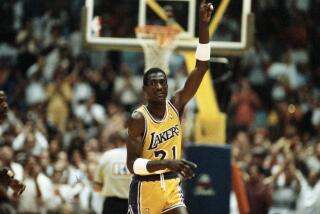Some overdue recognition for a basketball trailblazer
When former UCLA basketball player Don Barksdale died of cancer of the esophagus in March 1993, his passing was noted in a two-sentence obituary in The Times, a woefully inadequate summation of an extraordinary life.
Barksdale, a 6-foot-6 center from Berkeley and a Bay Area legend not only as an athlete but also as a TV host, disc jockey, nightclub owner and philanthropist, was an African American trailblazer -- “kind of like the Jackie Robinson of basketball,” says his friend and unabashed cheerleader, documentary filmmaker Doug Harris.
Harris, a former Golden State Warriors draft pick who wrote, directed and produced a tribute to Barksdale’s life that will air next month on FSN Bay Area, believes his late mentor was worthy of much more than a footnote.
Harris, 46, is leading an effort to get Barksdale posthumously inducted into the Naismith Memorial Basketball Hall of Fame in Springfield, Mass.
“This is a person that people need to know about,” says Harris, whose exhaustive efforts already have helped land Barksdale in halls of fame honoring California community college athletes, African American athletes, Bay Area athletes and Pacific 10 Conference athletes. “I would like young people to know about Don Barksdale, know about his legacy, the way they know about Jackie Robinson.”
As chronicled in Harris’ documentary “Bounce: The Don Barksdale Story,” which the filmmaker hopes also will air in Southern California, Barksdale was college basketball’s first African American consensus All-American -- as a senior in 1947. He was the first black basketball player on the U.S. Olympic team, winning a gold medal in London in 1948. He broke the color line in the AAU’s national industrial league, which welcomed him when the NBA would not. And although others of his race beat him to the NBA by a year, Barksdale was the first African American to play in the NBA All-Star game, suiting up for the East in 1953.
All this after Barksdale was left off the basketball team at Berkeley High -- he was cut three years running -- for reasons that had nothing to do with his ability. As Barksdale recounted years later, his friend Em Chapman already was on the team and coach Jack Eadie told Barksdale, “One black is enough.”
Undeterred, Barksdale honed his skills at a Berkeley park, starred at Marin Junior College and followed his idols, Robinson and Kenny Washington, to Westwood, where in 1943 he helped UCLA end a 42-game losing streak against USC.
After returning from World War II, where he served in the Army, Barksdale continued to star at UCLA while also kick-starting his business career by opening a record store on Western Avenue.
Though his Olympic coach was Kentucky’s Adolph Rupp, a man not known for his racial tolerance, he was the third-leading scorer on the U.S. team in the 1948 Games.
In 1949, the personable Barksdale was hired to be the Bay Area’s first black television host, moderating a program called “Sepia Revue” that featured the leading black entertainers of the day, among them Duke Ellington, Count Basie, Nat King Cole, Sammy Davis Jr. and Louis Armstrong.
In 1950, he was one of the first four black players taken in the NBA draft. But he was doing so well financially -- by then, he had also opened a beer distributorship -- that he didn’t sign with the Baltimore Bullets until 1951, when he doubled as a 28-year-old rookie forward and host of the Bullets’ postgame radio show.
He played two seasons with the Bullets and two with the Boston Celtics, averaging 11 points and eight rebounds, before ankle injuries forced him to retire in 1955. Before leaving, though, he recommended Bill Russell to Red Auerbach.
“It’s a travesty more people don’t know about him,” Harris says.
After his playing days ended, Barksdale continued his successful business career, opening nightclubs in Oakland. He founded Save High School Sports, a fundraising effort in Oakland that was a savior to prep athletes during a budget crunch in the 1980s. And as a scout for the Warriors, he recommended they draft a 6-foot-8 Berkeley High graduate from Central Washington named Doug Harris.
An eighth-round pick in 1983, Harris never played in the NBA, but he remained indebted to Barksdale and got to know him better through their work with Athletes United for Peace, a Bay Area nonprofit.
Harris’ film on Barksdale was an outgrowth of the thesis he put together to complete work toward a master’s degree in interdisciplinary studies that he earned from Cal State Monterey Bay in 1998.
His lobbying for Barksdale since has been nothing short of a labor of love. On Feb. 16, he’ll find out if Barksdale is among the finalists being considered this year for induction into the Basketball Hall of Fame.
Whatever the result, Barksdale’s sister, Pamelia Barksdale-Gore, says she is “astounded” by Harris’ efforts on behalf of her brother.
“Don would be very pleased and proud of all this,” she says.
No big deal, Harris says.
“It’s the right thing to do,” says the filmmaker, who since 1993 has served as executive director of Athletes United for Peace, which sponsors sports and media-arts programs for disadvantaged youth. “If we’re not proactive in telling some of these untold stories, they’ll never be told. Everybody will be gone.”
*
More to Read
Go beyond the scoreboard
Get the latest on L.A.'s teams in the daily Sports Report newsletter.
You may occasionally receive promotional content from the Los Angeles Times.










